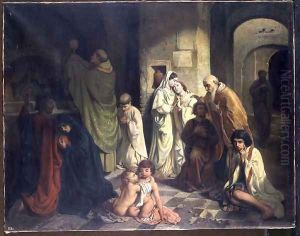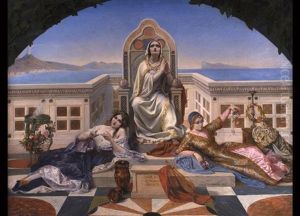Charles Louis Fredy de Coubertin Paintings
Charles Louis Frédy, Baron de Coubertin, also known as Charles de Coubertin, was a French artist and sculptor, but he is not to be confused with his nephew, Pierre de Coubertin, who is the well-known founder of the modern Olympic Games. Charles de Coubertin was born on November 23, 1827, in Paris, France. He was a part of the French aristocracy and was deeply involved in the arts and culture of his time.
Charles de Coubertin developed an interest in art at a young age and pursued his passion for painting and sculpture. He was a contemporary to many of the artists who were part of the French academic art movement in Paris, which was characterized by the production of works in a traditional and formal style that adhered to the regulations and standards set by the Académie des Beaux-Arts.
Throughout his life, Charles de Coubertin exhibited his works at various salons and exhibitions, contributing to the vibrant art scene of the 19th century in France. His works, however, have not been as widely recognized or remembered as those of some of his contemporaries, and as a result, detailed accounts of his artistic career are somewhat scarce in comparison to more well-documented artists of his era.
Charles de Coubertin's personal life and professional career were largely overshadowed by the achievements of his nephew, Pierre de Coubertin, who became a significant historical figure due to his role in reviving the Olympic Games. Despite this, Charles de Coubertin's contributions to the art world during his lifetime were a part of the rich tapestry of French cultural history.
Charles Louis Frédy, Baron de Coubertin, passed away on October 9, 1908. While he may not be as widely celebrated as other artists of his time, his work remains a testament to the artistic endeavors and cultural heritage of the France of his era.

